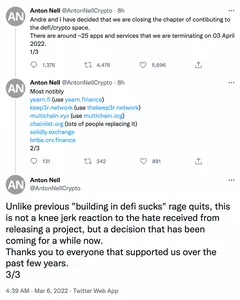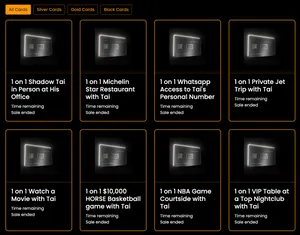The problem with this whole scheme is that Julian Sanders does not actually control the Sander estate — it was sold in 1992 by Gerd Sander (August's grandson, and Julian's father) to the Cultural Foundation of the Stadtsparkasse Cologne. That group was surprised to see all of Sander's work suddenly being sold as NFTs without their permission, and submitted a legal notice to have it taken down from OpenSea. OpenSea complied with the request on March 7. After almost two weeks of stalling and deflecting questions about the delisting without even acknowledging the cause, Fellowship and Julian Sander finally released a statement on the issue on March 18. Sander wrote that "a third party... claims to have certain rights in August Sanders' photographs" but that he "believe[s] the complaint is not valid" and would be working with his lawyers to have the collection reinstated. As best as I can tell, it seems that Sander is trying to argue he is entitled to sell his great-grandfather's work as NFTs because he physically possesses the negatives, despite the fact that the Cultural Foundation owns the usage rights to all of Sander's work.
Over 10,000 NFTs of photographs by August Sander are delisted from OpenSea after being created without permission
Influencer Jake Paul alleged to be repeatedly promoting projects without disclosing his financial involvement
Paul allegedly tried to cover his steps by creating a new crypto wallet to receive payments for each promotion, but then transferred the money a wallet he controlled to cash out. Oops. Some of the projects that Paul hyped in his undisclosed promotions included League of Sacred Devils, $MILF, and $YUMMY.
- "Exposing Jake Paul's Scams", YouTube video by CoffeeZilla
Andre Cronje and Anton Nell suddenly ditch their 20+ defi projects
"NFT mortgage lender" Bacon Protocol is hacked for $1 million
BattleCatsArena apparently rug pulls several weeks after launch
- Tweet by danvee.eth
- BattleCats Arena OG on OpenSea
- Contract address on Etherscan
NeosVR virtual reality project jettisons its crypto component after a team blow-up
Tai Lopez releases an exorbitantly-priced NFT project where people can buy access to him
Some people in the crypto community responded with disdain at the project, describing it as a "cash grab". One NFT influencer tweeted "Hey @tailopez legit question: Why Would I pay 30-40k to watch a movie with you? or 80-90k for your WhatsApp? Who u think u are? U def have a shady reputation and doing this only adds more fuel to the fire. I respect anyone wanting to add value to NFTs but this is not the way." Others were surprised at the project's smart contract, which not only automatically transfers any money out of the project and into the team members' wallets, but requires the NFT buyer to pay the gas fee for that transaction in addition to normal gas fees for minting.
Nemus Earth plans to buy and protect land in the rainforest... with Ethereum NFTs and a Brazil nut plantation
The whitepaper also addresses that the project will be built on the Ethereum blockchain. There is a section about "pros & cons of Ethereum", which has one section: gas fees. Apparently the project based on environmental conservation has decided to simply gloss over the enormous energy consumption, emissions, and electronic waste stemming from the Ethereum blockchain.
The project opened its second round of minting on March 3, and is offering its NFTs for mint prices between 0.06 ETH and 19.44 ETH ($150 to $50,000).
OpenSea blocks Iranian users
OpenSea said in a statement that "OpenSea blocks users and territories on the U.S. sanctions list from using our services", though it's unclear why this change seems to only have come into effect recently.
MetaMask and Infura block Venezuelan users, at least briefly
Some Venezuelan users were furious with MetaMask, feeling that their choice to prevent them from using the platform was incompatible with the decentralized and deregulated nature of much of crypto. One Twitter user wrote, "MetaMask Do not tell me that you became Centralized, I have this problem and many people in Venezuela have the same".
ConsenSys later appeared to say that the block of Venezuelan users was in error, writing that "In changing some configurations as a result of the new sanctions directives from the United States and other jurisdictions mistakenly configured the settings more broadly than they needed to be".










